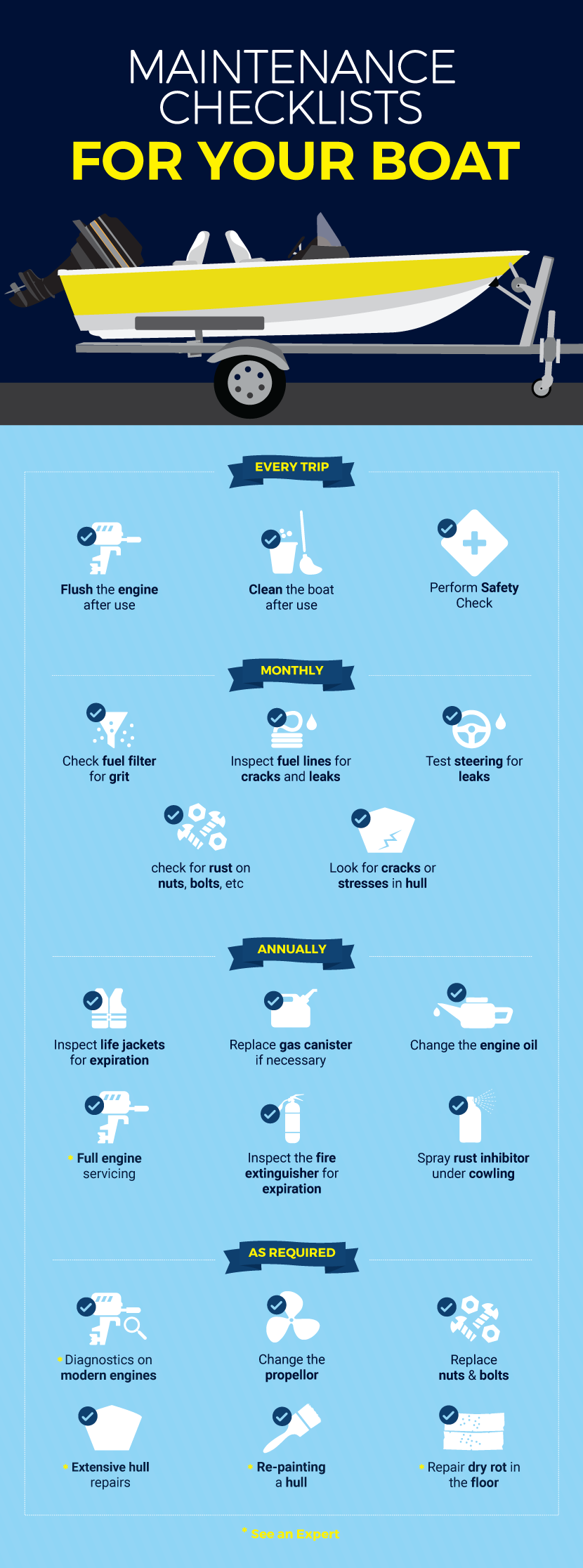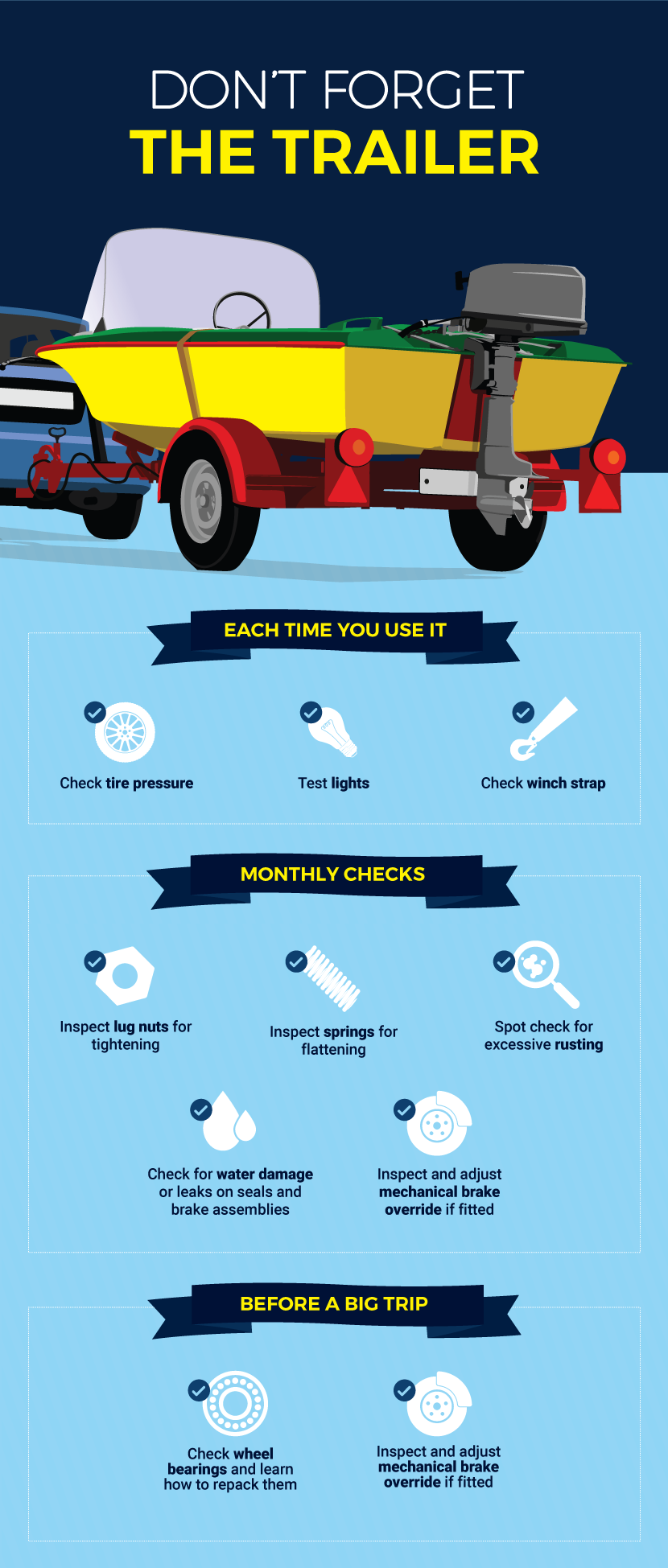Make the Most of Your Time on the Water:
Boat Safety and Maintenance Tips
Have you ever arrived at the boat ramp or trailer only to discover you can’t head out because you've
forgotten essential equipment or overlooked something that needs repair?
Planning and regular maintenance will reduce these instances and ensure a safe and enjoyable day for all.
Have an “Every Trip,” Monthly, and Annual Checklist
Before you head out, you should always have a way to ensure that all the little bits are on board and that
the boat will start when you arrive at the ramp. Having a system in place can help, but a checklist is often
the simplest way to avoid drama. You should perform the following before you leave on every trip.
First and foremost, check the weather.
Make sure you have the right safety gear and that it’s in working condition. Regardless of where you’re boating,
there are many items you should have at hand. These include life jackets, an air horn, a flashlight (with working batteries!)
or other light source, and distress-signal senders such as flares and a radio beacon for indicating your position
in an emergency. You should also have an accessible fire extinguisher on board.
In addition to the safety gear, check your fuel level and make sure all necessary batteries are working,
that you have a tool kit, and that the bilge pump is working.

You should also perform a monthly walk-around of the boat. Check things like the fuel filter and ensure it is free of grit.
Be sure to look closely at fuel lines and ensure there are no cracks or leaks, as these could ruin your day or, at worst,
cause a major accident. Look for corrosion and rust and replace nuts and bolts or parts as necessary.
Ensure the steering is working efficiently and not leaking. Your walk-around should also extend to the hull,
where you’ll check for stresses and cracks.
Annual checklists should cover the safety gear. Make sure inflatable life jackets are within their usable date and
replace gas canisters if necessary. Your fire extinguisher should also be checked annually – you'd be surprised how often
these are left to decay in the boat. Flares are another item that can go out of date.
They will last up to three years in most cases, but they should be on your annual checklist.
Ensure Safety On Board
Safety is crucial and could save someone's life if you capsize or are in a collision. Before you head out, check the weather
for where you are going. Be aware of your boating ability and respect it. Also, consider your guests and how they will react
in an emergency. Designate someone to act as safety officer/assistant captain. That way, if something untoward happens to you,
there is another person in place to get you home. Also, it is imperative that you let someone who’s not on board know where you
are going and when you expect to be back. If appropriate, also notify the local coast guard or the harbormaster. Remember to
log on and log off.

Once on board, brief your guests on where the life jackets and other safety items are located. (Such things often aren't but should be stored in an
easily accessible place on the boat.) If you have any concerns, don't try to be the tough guy and act as if nothing is wrong. Give clear and precise
instructions to those on board. Knowing who can and cannot swim is also a crucial but often overlooked element of safety: be aware of the abilities of those
on board.
If you have an inboard engine, make sure you run the blower for a few minutes before kicking it over. This will siphon off deadly and possibly
explosive gas from the engine compartment. If your blower isn't working, open the cover and wait for the gases to escape.
I also recommend always keeping an anchor on board, rigged and ready with rope attached. If you run into engine trouble, this could save you and your
boat from running aground, with devastating consequences. Make sure the shackles are tight – they can loosen – or better still, tie them with a small piece
of wire.
Common sense is sadly lacking in many instances, so use yours. Stay alert and aware of what is going on around you and, most importantly, avoid alcohol,
which can certainly cloud your decision making.
Maintenance: What You Can Do and When to Hire an Expert
Depending on how handy you are, there are some things you can do yourself that will keep your boat and engine running smoothly over time.
Where you keep your boat is most crucial to the life of the gelcoat or timber. If you must leave it outside, buy a good-quality cover to keep it
safe from harsh sun and weather and to keep leaves out. Ideally, you always store your boat in a garage.
After the boat itself, the engine is the next most expensive piece of equipment. Modern engines are designed to need less regular maintenance than those
of the past, but you should always be aware of the regular scheduled service points and meet them.
There are certainly things you can do yourself to protect the engine, such as flushing it out after every use in saltwater. The salt can form a crust in
the engine and corrode its parts. Running it through with freshwater means the salt won’t sit in your engine causing damage.
Taking the cowling off and running a light spray of rust inhibitor and water repellent, like WD40, inside will also keep cables and wiring from corroding
or becoming damp and ineffective over time.
Properly winterizing your boat for idle times can make using it the next time that much easier. Inboards have their own set of processes.
Draining and replacing the oil is important. Some of us have the skill set to do this, but if you're unsure, call in an expert. We also recommend
removing spark plugs and wiping down the engine with a cloth dipped in WD-40.
Outboard maintenance is a simpler proposition and involves running freshwater through the engine and disconnecting the fuel hose and running the engine
till it stops. This will ensure all fuel is drained from the carb to prevent any buildup of deposits from evaporating fuel. You could also change the oil
in the skeg, although again, this is more often done by a professional.
Another DIY task is looking after fuel tanks, which are notorious for harboring condensation over long periods. Always check your inline fuel filter
and water separator for moisture, and if you are leaving the boat for a while, fill the tank completely to avoid such problems.
Don't Forget About the Trailer
Trailers used for smaller vessels come at a cost, and the constant dunking into water takes its toll on the components. Check the wiring regularly to
ensure it works and replace it if necessary. Try to check the trailer when the boat is not on it so you can see all the parts.

Knowing how to repack the trailer’s bearings is a good skill to have. If you're unsure about them, drive for a bit, and then check to see if they are
scorching hot at the hub. If so, it's likely they are not operating properly.
Always hose your trailer thoroughly with freshwater after salt exposure. Failure to do so will result in a very sad-looking trailer.
It is quite amazing that valuable boats are so often seen sitting on the side of the road not being looked after. Those who do spend the time on
maintenance will end up with a boat that stands the test of time and is motoring on well after many boats of a similar age have become a fancy
ornament in a field.
Embed the article on your site

